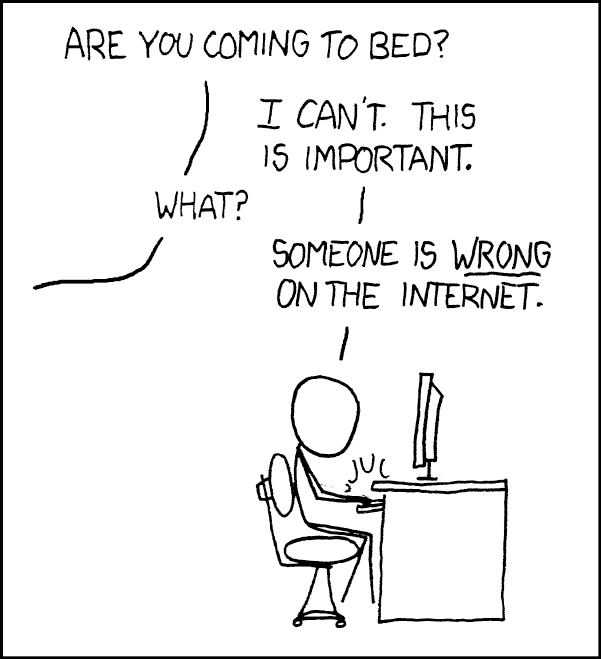How To Get Internet Feedback Without Going Insane
The world will flood you with enough advice to drown you.

If you are trying to create something cool and creative, at some point you are probably going to want feedback from others. I certainly do. Even geniuses make mistakes, and I'm no genius.
Happily, we have the internet! Every minute of every day, you can show your work to people and get feedback. Waves of feedback. Floods of feedback. Enough feedback to drown in it. Some of it mean and vicious.
I have long written about the value of Filtering Your Inputs. Our brains are delicate and plastic. Too much feedback, especially when it's hostile, has a way of getting into a creator's head. If I read too many opinions, it really disorients me. I get too many voices in my head, and I can't confidently make decisions anymore.
It's a tough problem, especially since engaging with your community is a very helpful activity to get traction selling your work online. I like to chat and answer questions, but I want control over the sort of feedback I get.
(I was motivated to write this by seeing this video. It’s by a developer who quit trying to be an indie, and part of the problem was the despair caused by too much unfiltered online feedback. He talks about it in the first few minutes.)
So here is some unsolicited advice on how to get good advice without going insane.
You Can't Just Filter The Bad Advice
Human brains evolved to be very trusting. When I get feedback, even if it's clearly not helpful or in bad faith, I have to spend energy analyzing it, debunking it, and getting back to work.
I simply don't have this time and energy to spare.
So, when I engage people online, I do my best to avoid reading too many unfiltered opinions. The decades have taught me that, unless I've just released a game and are looking for bug reports, there's just no profit in listening to the raw feed.
(This is why releasing an Early Access game terrifies me.)

What I Do Instead
I occasionally ask for volunteer beta testers. I create my own private community full of people who are allowed to go at me full blast. I want criticism. It is necessary. It just has to be helpful.
Sometimes, we ask for volunteers. Sometimes people write us with bug reports, and we see if they're interested in testing. Some Kickstarter backers get early betas. From these sources, we have built a loyal beta tester squad. It is only through their patience and hard work that I can stay in business. I am immensely grateful to them.
If you can handle the opinions of the horde being screamed directly in your brain, that's great, but I have observed that most creators can't. So if you create online and your work is getting traction, consider trying to build a small testing community.
What Do I Want In A Tester?
There are obvious things. They need to have a good working computer and give comprehensible feedback with support files (like saved games) when needed. They have to play the game. They have to be reasonably polite. Pretty obvious stuff.
Outside the obvious, when looking for a constructive criticism person, there are three things the person needs to be helpful:
1. They Have To Be Able To Give Harsh Feedback
They have to chew me out when I deserve it. Politely, but still.
When I make a small testing community, I'm not making a bubble. I'm not starting a cult. I need people who can criticize!
I have had testers who found SERIOUS problems, but they were nervous or shy about pointing them out. Some testers quit because the need to report flaws was too stressful for them. It happens. I wish them well.
2. They Must Criticize In Good Faith
I don't need trolls. Or power struggles. I need people who genuinely want to take part in an act of creation, and they need to want to make the game better.
Also I provide beta testers with something valuable: A purpose. There is happiness and meaning in being able to take part in an act of creation. I listen to testers feedback very carefully, I let them make a difference, and I make sure they know they made that difference.
But the focus has to be on helping to create better art.
3. They Must Be On Board With What I Am Doing
I write turn-based games. Story-heavy. With low budgets and lots of reading. So I need testers who are into that sort of game.
This is a far bigger deal than it might seem.
One of the key perils of listening to unfiltered input is that a lot of people will just throw their anger at you because you're making a thing they just don't care for.
If you want to tell me I should write a multiplayer game, or you hate turn-based games, or you only like games with great production values, well, I'm afraid that isn't actually helpful to me. In fact, it makes me feel bad that I can't make you happy, even if it is impossible for me to make you happy.
Disappointing people makes me sad. I don't like feeling bad, and it certainly doesn't help me work. So I only recruit as testers people who are actually fans of the sort of thing I like to make.

Note One Thing Missing From This List
I did not add ...
4. They Have Good Taste And Make Good Suggestions
Seems like a natural thing to add to the list, and yet ...
The honest truth? Pretty much every single tester I've ever had who had qualities 1 through 3 ended up having 4 automatically. Every nice person who likes turn-based RPGs has given me solid advice. I didn't always act on it, but they always had a point.
People are actually pretty cool overall.
This Is All Just Like My Opinion, Man
If you want to create online, you should take mental self-protection seriously.
I have seen so many battle-hardened creators crash out because they read the wrong feedback at the wrong time. Some were friends, some became Extremely Mad Online.
Our brains are pliable. It's a great quality! It's what makes us able to be artists in the first place.
Just, when some stranger gives you a big pile of opinion, remember: About 30% of people are mean. About 30% are crazy. And a lot of people are both.
Be careful who you let into your head. Filter your inputs. That's my free advice. Good luck!
Spiderweb Software creates turn-based, indie, old-school fantasy role-playing games. They are low-budget, but they’re full of good story and fun. We have announced our next game, Avernum 4: Greed and Glory. Wishlists are greatly appreciated.
This newsletter is free. However, the existence of paid subscribers makes me feel guilty if I don’t update it enough, which results in more posts.


There are reasons why PR is an actual devoted career, and few larger outfits put the developers directly in the firing line of their audience. Because it absolutely is an expenditure of energy and time engaging with that, parsing that, and sorting that. Even in the absence of offense, the sheer dispassionate reality is… do you 𝙧𝙚𝙖𝙡𝙡𝙮 have the time an energy to sort through hundreds of reviews and God knows how many forum posts?
Even when most of them are good (and looking at Steam they are), that’s just too much to ask a guy who also has to do… I’m going to guess not 𝘦𝘷𝘦𝘳𝘺𝘵𝘩𝘪𝘯𝘨 at Spiderweb, but definitely far more than just what anyone who simply calls themselves a “developer” or “software engineer” has to on a regular basis.
But… dealing with the sum total of all public feedback just isn’t realistic. Not in scope. You’d need a PR department for that. And in practice it’s healthy for there to be layers of impersonal distance between the feedback and the creator. Someone criticizing a product “your company made” is a lot easier to not take personally than a thing that 𝙮𝙤𝙪 personally made. That distance helps filtering out the nonsense a lot easier and less emotionally taxing.
But you don’t have a PR department separate from the development department. You probably don’t even have a custodial department separate from development department. You got you. And you’re great. But there’s only a limited amount of you to go around. There are simply better uses of your limited you than trying to pick through the mountains of faceless feedback looking for treasure.
Uses like this blog. At least I think so.
It’s a mistake thinking you can make us believe that you were no genius 🥳